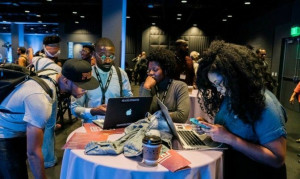If you’ve done some soul searching and have determined that a career writing code appeals to you, you’re likely facing the daunting question of where to start. To help you figure that out, I’ll share some of my journey and the resources that I found helpful.
Listen to the audio version of this article:
Learn the Basics
Before acquiring any new skill, identifying your learning style is critical. Some people learn better in a classroom-style setting with a teacher, some from reading textbooks, and others from an online course style. Once you know how you learn, you’ll need to assess your base knowledge as well. If you have a computer science, engineering, or math background, learning to code is easier because of transferable skills.
Based on my learning style and skill set, I chose an online boot camp called Career Foundry. It offered a six-month self-paced lesson plan, an online mentor you could reach 6-8 hours a day, and a coding language--Ruby on Rails--that’s commonly accepted as palatable for beginners with no computer science background. Though I did not find the mentorship component of Career Foundry particularly effective and ended up having to solve a lot of problems on my own, I was able to complete the course in three months and mastered the basics of web development.
Test your Skills
With my courses completed, I had to determine my next steps. Eager to test out my skills, I considered finding a job. However, few companies want a completely fresh, self-taught developer, and I had started my journey with more entrepreneurial ambitions. So I chose to use a personal project to get some practice. I had founded an online business for a few years at the time, but I absolutely hated the current website, so I rebuilt the site to sharpen my skills and start the process of building my portfolio. I then started reaching out to friends who owned businesses or knew other business owners who were looking for new sites and charged a nominal amount just so I could build my portfolio and skills.
Ultimately, the name of the game here is to keep writing code! Even if you take on free projects, find opportunities to practice writing new code that challenges you so that you don’t lose what you’ve already learned. The worst thing you can do is spend all of your time job hunting and not programming more. If you’re looking for employment, your free/passion/side projects come in very handy as they demonstrate that you actually enjoy coding and that you’re committed to learning and growing in the industry – all very critical characteristics needed to endure and succeed as a developer.
Stay Plugged in to the Industry
As I’ve grown as a developer, I’ve gotten a bit more comfortable, but still occasionally face challenges because I work solo most of the time. But I’ve found that a lot of learning happens from conversations with other developers so I’ve made an effort to connect to other developers through various sources. These connections have helped me find solutions to many of the problems I’ve encountered. Be sure to build professional relationships with other programmers who can share their experience and expertise with you if you ever get stuck.
If you’re ready to make the leap into coding, check out these resources that have helped me on my journey from clueless about code to full-stack web developer.
Learning Code:
Codeacademy - Probably the best free online resource to get your feet wet in code and see if it’s even for you.
Team Treehouse – Really good, comprehensive online video tutorials.
Bitmaker Lab and Lighthouse Labs – Classroom-style coding boot camps – intensive and often guarantee job placements.
Developer Resources (when you’ve learned some code):
Stack Overflow – Mark my words, you’ll spend arguably as much time on this site as you will on Google.
Code Mentor – Pricy, but when you’re absolutely stuck on a problem, it can get you out of a jam.







